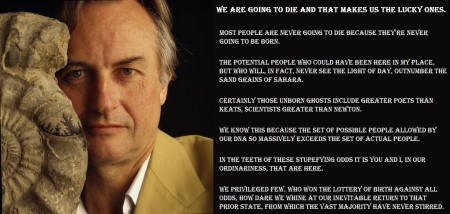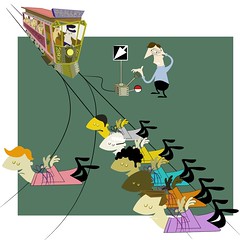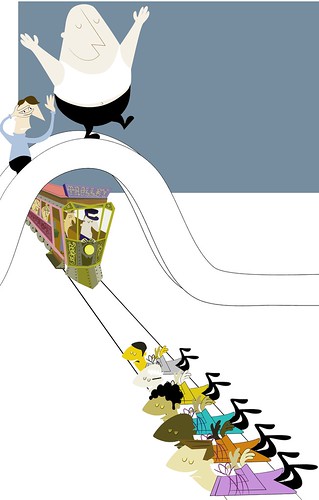
Also worth repeating, in light of the tiny captioned question ("Yes, but what are your goals?") : "A yes, a no, a straight line, a goal," Nietzsche's "formula" of happiness. Not that it worked out all that well for him. Robert gave us an excellent report on Nietzsche Monday in CoPhi, btw.
Philosophy's message is unchanged: you don't have to follow anybody. Sapere Aude, as Kant enjoined. Have the courage to use your rational capacity. Think.
You could do worse, if you really wanted to think for yourself, than follow the example of Peter Singer, “the best known living moral philosopher” who urges us to "think through" what most take for granted, then alter our acts and assumptions accordingly.
Singer's on our final CoPhi bill (after John Searle and Alan Turing [PhilDic] at the end of Little History of Philosophy today. And, one last pitch from Carlin Romano, making the case for viewing Barack Obama as "philosopher and cosmopolitan in chief."
“How should we treat animals?” Respectfully, of course. But does that mean we can eat them or not? Singer says no. Michael Pollan, among others, says maybe. I say I wish they’d build a better Boca Burger.
Yesterday in Bioethics Elijah gave us a different question regarding the ethical treatment of animals: are you cool with people keeping exotic, non-indigenous "pets"-ions and tigers and polar bears, and King Cobras, and foxes? I'm not, both for the animals' sake (an objection that applies at least as much to zoos and circuses) and for public safety. "Owners" can risk their own skins if they want, but not that of their neighbors and the kids next door.
Alan Turing was a strange, heroic, and tragic figure who contributed more to preserving the world we had (by cracking the Nazis’ codes) and shaping the digitized world we live in now (by contributing to the creation of the computer). Turing’s Cathedral… The Enigma
Turing’s test for artificial intelligence is said by some to imply that if something functions intelligently, it is intelligent; and if its functionality resembles human personality in superficial ways, we may then speak of it as possessing human-grade intelligence.
And who knows? If you’re prepared to entertain that proposal, maybe you can also envision a mainframe host in your personal future. Maybe there will be a way to “map the billions of functional connections” of your brain onto a machine capable of replicating and preserving your intelligence and memories. Welcome to the brave new afterlife.
Seems pretty far-fetched, and it’s unclear that one’s hopes and dreams and delights– the stuff of embodied personhood– can be replicated in any meaningful sense. Never mind whether they should be. Planet’s pretty crowded as it is, and maybe one time around the wheel is only our fair share.
And anyway, as John Searle says, tests like Turing’s may not be any more conclusive about real intelligence than his Chinese Room thought experiment.
Advances in AI don’t seem to have come as quickly as some have speculated they might. But it’s still fun to ponder the possibilities, as Richard Powers did in his wonderfully informed and entertaining Galatea 2.2.
What a moment we find ourselves in! Ray Kurzweil calls this the Age of Spiritual Machines. Have you seen Transcendence or Her? If you can just live long enough– until the year 2040 or so, last I heard– you can live forever too, say the Singularitarians. They mean you, kids. And Ray’s popping enough vitamins to delude himself into thinking that maybe he means himself as well. Good luck. I’m not holding my breath. I confess, I used to have a Sleeper fantasy like Woody’s. But Ted Williams kinda ruined it for me. (Fresh Air 12.3.13)
The best form of immortality may be the same as it ever was: a legacy rippling across time, impacting lives far beyond one’s own. Alan Turing didn’t live long enough to get himself fully digitized, but the digital world he set in motion has already secured a legacy likely to outlive us all. It dwarfs the primitive world of reflexive sexual bigotry he had to suffer in his brief lifetime.
To those who have a hard time fathoming how machines might ever acquire self-awareness, intentionality, and thought, Turing asks you to ask yourself: how did we?
Instead of trying to produce a programme to simulate the adult mind, why not rather try to produce one which simulates the child’s? If this were then subjected to an appropriate course of education one would obtain the adult brain. “Computing Machinery and Intelligence”
Singer’s challenge. Peter Singer challenges the way we live in the relatively prosperous western world (“western” here is less a geographic designation than a state of mind and material comfort) on many fronts, including how we eat, how much we luxuriate, how much we earmark for our own offspring, and how much we give away to strangers. He sets the bar of selfless generosity much higher than our culture of consumption rewards. But the rewards of consumption don’t begin to match those of humane compassion.
- “If it is in our power to prevent something bad from happening, without thereby sacrificing anything of comparable moral importance, we ought, morally, to do it.”
- “If possessing a higher degree of intelligence does not entitle one human to use another for his or her own ends, how can it entitle humans to exploit non-humans?”
- “The Hebrew word for “charity” tzedakah, simply means “justice” and as this suggests, for Jews, giving to the poor is no optional extra but an essential part of living a just life.”
- “Just as we have progressed beyond the blatantly racist ethic of the era of slavery and colonialism, so we must now progress beyond the speciesist ethic of the era of factory farming, of the use of animals as mere research tools, of whaling, seal hunting, kangaroo slaughter, and the destruction of wilderness. We must take the final step in expanding the circle of ethics.”
- “To give preference to the life of a being simply because that being is a member of our species would put us in the same position as racists who give preference to those who are members of their race.”
- “Philosophy ought to question the basic assumptions of the age. Thinking through, critically and carefully, what most of us take for granted is, I believe, the chief task of philosophy, and the task that makes philosophy a worthwhile activity.”
Singer’s website… Practical Ethics… The Life You Can Save… Animal Liberation… “The Singer Solution“… “Unspeakable Conversations“
So, the end is nigh. But since it's really not: carry on. Keep asking questions, create satisfaction,follow your bliss, and again: "your own track, kid, not what your guru tells you."


"The important thing is not to stop questioning. Curiosity has its own reason for existing. Always question everything. Without questioning we would never learn. If we ask the wrong questions, we at least learn from our mistakes."
But you don't have to take his word for it.




